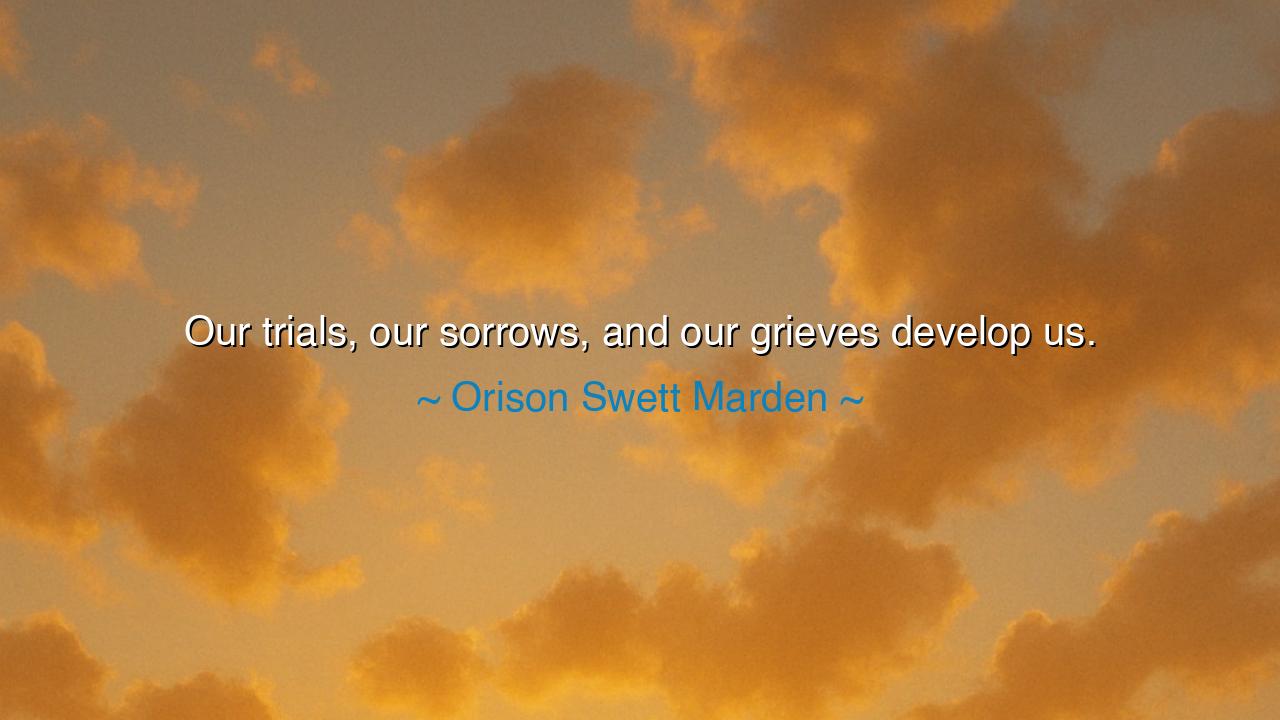
Our trials, our sorrows, and our grieves develop us.






Orison Swett Marden, the father of modern inspirational thought, spoke with clarity when he declared: “Our trials, our sorrows, and our grieves develop us.” In these words he names what many flee from: that the very things we dread, the wounds and hardships of existence, are the chisels that shape our souls. Ease may comfort us, but it is struggle that strengthens us. Joy may delight us, but it is sorrow that deepens us. Grief may wound us, but it also awakens us to the profound value of what we have lost.
The ancients also taught this eternal truth. The Stoic philosopher Epictetus, himself once a slave, declared that hardship is the training ground of the spirit, that without trials a man remains untested, unproven. Hercules was not born a hero in comfort, but in his labors — his twelve impossible tasks that forged his name into eternity. So too Marden proclaims: our sorrows are not curses, but teachers; our grieves are not chains, but fires that temper us like steel.
History is filled with such examples. Consider Abraham Lincoln, who endured repeated political defeat, crushing personal loss, and the heavy burden of a nation at war. From his trials he grew patient; from his sorrows he grew compassionate; from his grieves he drew the strength to preserve the Union. Had his path been smooth, he might have been forgotten. But because it was hard, he was carved into greatness. His life is proof of Marden’s wisdom: struggle does not break the worthy — it builds them.
Yet in the moment, sorrow rarely feels like a gift. The mourner feels only the emptiness left behind. The sufferer feels only the weight of pain. But time, and reflection, reveal that each blow to the heart broadens it. When we suffer, we learn to recognize suffering in others; when we endure grief, we learn tenderness; when we pass through trials, we discover hidden reserves of strength. Marden reminds us that the soil of greatness is watered not by ease but by tears.
This truth also warns us: to flee sorrow, to avoid difficulty, to resist all grief, is to remain undeveloped, like clay that has never felt the fire. It is in the fire of hardship that beauty emerges — as the potter’s kiln hardens the fragile vessel, as the storm strengthens the oak. Thus, though we do not seek pain, we must not despise it. To live fully is to embrace both joy and sorrow, knowing that each has its sacred role in our becoming.
The lesson for us is clear. When trials come, do not curse them, but ask what they are shaping in you. When sorrows pierce, let them awaken compassion rather than bitterness. When grieves weigh you down, remember that they are forging endurance and wisdom. Practically, this means meeting hardship with patience, reflecting on its lessons, and using it to serve others who walk the same path. For suffering shared becomes lighter, and wisdom born of pain becomes a torch for those who follow.
So, O children of the future, carry Marden’s words in your heart: “Our trials, our sorrows, and our grieves develop us.” Do not envy the one whose path is easy, for ease leaves the spirit untested. Do not despair when your path is hard, for the hard road leads to depth and greatness. Embrace your struggles as the teachers they are, and let them mold you into one whose life, though marked by wounds, shines with strength, compassion, and the unshakable dignity of one who has endured.






AAdministratorAdministrator
Welcome, honored guests. Please leave a comment, we will respond soon